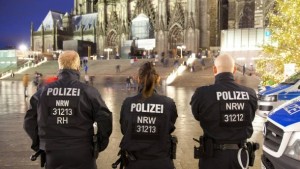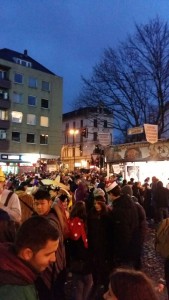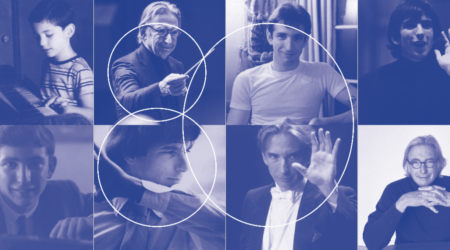Cologne: Paying a Heavy Price for Germany’s Open Door Refugee Policy
The threat of danger is always tucked away in the corners of our minds, bringing forth our animalistic instincts in a supposedly civil society. Large-scale celebrations such as New Year’s Eve and Cologne’s Carnival have been a means of letting go of such worries as people attempt to recharge their brains in preparation for long […]
The threat of danger is always tucked away in the corners of our minds, bringing forth our animalistic instincts in a supposedly civil society. Large-scale celebrations such as New Year’s Eve and Cologne’s Carnival have been a means of letting go of such worries as people attempt to recharge their brains in preparation for long periods of work. Unfortunately, it only takes one bad incident to change the way a celebration and its host are perceived.
The events that took place in Cologne at the beginning of 2016, as hundreds of women were assaulted by masses of men, set Germany and its allied states in Europe into panic. The country was caught off guard as unimaginable events unfolded leaving Germans anxious about the upcoming week-long drunken street festivals in Cologne.

Germans and other Europeans were left contemplating the future of their safety, culture, and core values after the crimes committed on New Year’s Eve by predominantly North African migrants, many of which were in Germany illegally. Political tension and intolerance towards refugees, and anyone of Arab background, is steadily rising as Germans begin to doubt the sincerity of their government. The bigger issue here is how this will affect both Germany and the European Union in the future, as this wave of crimes has caused political changes that many members are opposed to.
I’ve been a quiet observer in Cologne for the better part of a year, now. The people of Cologne are generally accepting to foreigners of all backgrounds; this is a major aspect of the city’s personality. However, refugees and asylum seekers seem to be in a category all their own for the residents of the Carnival Capital. The anxiety of accepting so many refugees became loud and clear starting in October 2015 when the number of refugees entering the country increased. However, it must also be pointed out that sexual assaults are not something new to the city, as I have personally experienced it on a few occasions prior to the increase in migrants.
The start of the New Year brought roughly five hundred cases of reported sexual assaults on women and even more accounts of theft. In one case, a woman was reported to be raped, while even a female volunteer police officer was molested. There were about a thousand men committing the crimes en masse in front of Cologne’s Dom Cathedral, many of whom will never be caught, as German officials later admitted. Those that were held in custody were asylum seekers, many of whom were illegally here from North Africa and who spoke neither German nor English. This caused wide scale panic throughout the city in anticipation of the Carnival celebrations in February.
Carnival lost a little of its spark this year as many people simply did not care to participate in the festivities due to safety concerns and bad weather. The celebration was massive nonetheless as streets were completely shut down to accommodate the thousands of disguised participants. People started drinking as early as 7 in the morning, culminating in the admittance of patients suffering from alcohol poisoning by eleven o‘clock later that morning. The locals refer to the week of Carnival as “the Crazy Days.”
Sexual assaults were committed during Carnival, especially on the first day, totaling twenty-two reports, one of which was of rape as a woman made her way home. Cologne enlisted the aid of 2,500 officers to oversee the events, but it wasn’t enough to prevent every incident. However, the crimes committed on New Year’s Eve and those committed during Carnival seem to be unrelated. The New Year’s Eve crimes were believed to be organized and committed by North African migrants and refugees, whereas those committed during Carnival were unorganized and conducted by “a cross section of the general public,” according to German officials. This doesn’t come as a shock considering the late hours during which people stay out drinking, the encouraged concealment of one’s identity, and the extreme consumption of alcohol during the celebration.
The wide scale assaults that took place on New Year’s Eve and during Carnival were shocking because of the way in which they were committed, but the problem isn’t new to Cologne. During the first few months I lived in the city, I had to venture home alone early in the morning after a night out with friends, or on several occasions I was simply on my way to work around 5:30 in the morning. I was assaulted on one occasion and harassed on several others. Sadly, I must admit that every time the aggressor was of Arab origin, usually speaking neither English nor German. These men wait in corners to spring out and aggressively follow you all the way onto the tram unless you are quick enough to maneuver into another compartment as the doors are closing. They touch at will and mutter what can only be interpreted as inappropriate comments. The one occasion on which I was assaulted was on my way home before heading off to school. A man came and sat behind me and started whispering in my ear in English. I tried to move, but he moved with me. I asked him in German to leave me alone but he refused to speak German. The moment I let English slip from my mouth he became more aggressive because he knew he could communicate with me. Finally, after a few stops of enduring this, he took his leave, but not before grabbing my face and kissing me on the mouth. By the time I could kick him away while men around me were already standing up to remove him, he slipped out as the doors were closing and our train left the station.

The politics and values of the EU are changing and the events that took place in Cologne have only helped to speed up the process. Germans no longer have faith in their government and EU member states that were once in agreement with Germany are going their separate ways. Germany’s Chancellor Angela Merkel made a mistake in the eyes of most when she decided to pass the open-door refugee policy which has brought 1.1 million asylum seekers to Germany in 2015 with three to four thousand more arriving daily. Citizens of Germany and of other EU states already feared the cultural, financial, and safety impacts that this sort of migration would have. New Year’s Eve seems to justify a part of that fear, with many believing that it will only get worse. As backlash to the open-door refugee policy, Merkel is now making a “dirty deal” with Turkey that will allow visa-free travel through any of the passport free zones currently part of the Schengen agreement in addition to promising to speed up the application process for Turkey to enter the EU. Many member states are against Turkey’s acceptance into the union, including Germany. This deal was made in exchange for Turkey’s help in turning away refugees who enter through Turkey. Unfortunately, there has not been evidence that Turkey is sending asylum seekers away.
The reality is that one cannot solve one problem without creating several others as a result and Germany’s Chancellor Angela Merkel is experiencing this as Germany and other EU member states are seeing the consequences of taking in too many refugees. Women were attacked en masse on New Year’s Eve by asylum seekers from North Africa, which caused fear of participation in Carnival, which is a beloved part of Cologne’s heritage. Germans feel that their freedom, rights, and safety are being compromised. Undesired political changes are taking place as Turkey accepts negotiations with Merkel to curb migrant entrance in exchange for visa-free travel throughout Europe and an expedited application process for Turkey’s EU membership.
Jacqueline Perrier-Gillette is currently a resident of Paris, France, where she lives with her husband. Together the two of them operate their small translation company, giving Jacqueline the opportunity to observe the French and their culture up close. She is an avid reader, writer, and student of foreign languages.
By Jacqueline Perrier-Gillette





